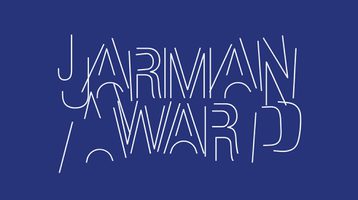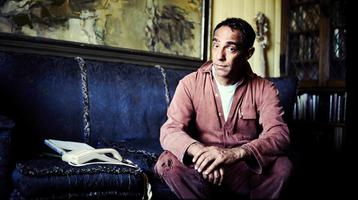News Story
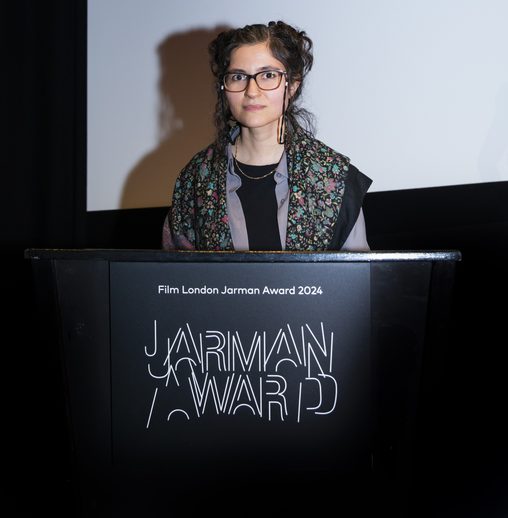
Maryam Tafakory at the Film London Jarman Award 2024 ceremony. Photo by Roisin Murphy.
On 25 November, Maryam Tafakory received the Film London Jarman Award 2024, the 17th edition of the annual prize.
Born and raised in Iran, Maryam Tafakory works at the intersection of film and live performance. In her practice, she creates poetic collages from archival material and the cinema of post-revolutionary Iran to address issues of censorship and prohibition. By exploring the different registers through which images speak or refuse to speak to us, her work attempts to dissect veiled acts of erasure – of bodies, intimacies, and histories.
Tafakory’s most recent work Razeh-Del (2024) uncovers the history of Zan [Woman], the first Iranian women’s newspaper published for just short of a year between 1998 until 1999, when it was banned. Woven in between a dense collage of newspaper print and glimpses of Iranian cinema, the film tells the story of two schoolgirls who write a letter to Zan, and imagine making an impossible film.
In Mast-del (2023), a forbidden relationship between two women emerges through layers of found and original footage, superimposed to fill in some of the cracks and deletions defined by the limits of representation. By inscribing the untold stories of disobedient bodies directly onto the images that silenced them, Mast-del re-employs the material of fictional cinema to reveal the hidden lives and political realities of contemporary Iran.
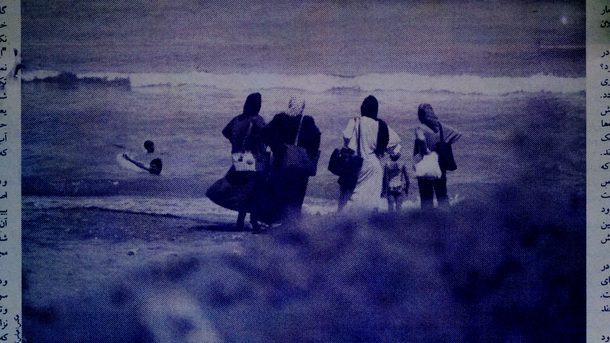
Maryam Tafakory, Razeh-del (2024), film still. Courtesy of the artist.
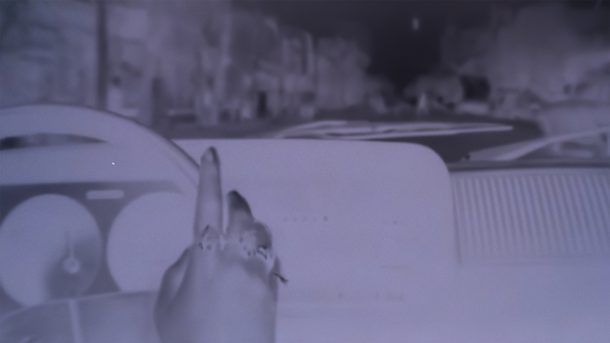
Maryam Tafakory, Mast-del (2023), film still. Courtesy of the artist
Nazarbazi (2022) is a film about love and desire in Iranian cinema, where depictions of intimacy and touch between women and men are prohibited. The film focuses primarily on images of women whose bodies have been erased and victimised in post-revolutionary Iranian film, alluding to discreet forms of communication that operate within yet circumnavigate the censors.
Using excerpts of Iranian films produced between 1990 and 2018, Irani Bag (2020) is a split-screen video essay which reveals how the depiction of a seemingly innocent object – the handbag – has been deployed as a stand-in for human touch.
Maryam Tafakory’s solo screenings and exhibitions include: MoMA, New York; National Gallery of Art, Washington DC; Academy Museum, Los Angeles; Museum of the Moving Image, New York; Filmoteca de Catalunya, Barcelona and LUX London. Selected group events include: Tate Modern, London; Cannes’ Directors Fortnight, Cannes; New York Film Festival; Locarno Film Festival; Toronto International Film Festival and Villa Medici, Rome. She was awarded the Gold Hugo at the 58th Chicago International Film Festival; the Tiger Short Award at the 51st Rotterdam IFF; the Barbara Hammer Feminist Film Award at the 60th Ann Arbor Film Festival; and the Best Experimental Film Award at the 70th and 71st Melbourne International Film Festival.
Maryam Tafakory was selected from a shortlist of six artists that includes: Larry Achiampong, Maeve Brennan, Melanie Manchot, Rosalind Nashashibi and Sin Wai Kin. She received a £10,000 prize.
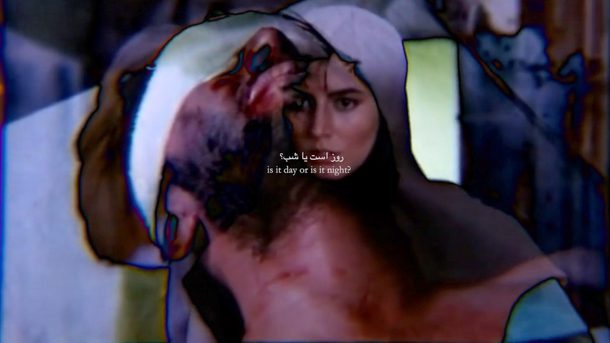
Maryam Tafakory, Nazarbazi (2022), film still. Commissioned by Film and Video Umbrella as part of BEYOND. Courtesy of the artist
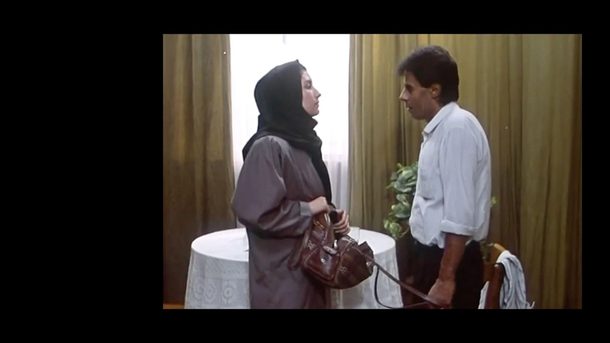
Maryam Tafakory, Irani Bag (2020), film still. Commissioned by the Asian Film Archive (AFA).Courtesy of the artist.
Matthew Barrington, Cinema Curator, Barbican, on behalf of the Jury said:
“Maryam Tafakory's practice is a compelling exploration of displacement, memory and resistance, interweaving archival fragments, poetry and personal narratives to craft deeply evocative works. Her films navigate historical and personal traumas with remarkable sensitivity, reflecting on the intersections of Iranian cultural identity and individual struggles. Tafakory’s innovative blend of reality and fiction through visual poetry, symbolism and archival compilation firmly establishes her as a worthy winner of the Jarman Award, showcasing an artistic voice that is both profound and essential.”
The 17th edition of the Film London Jarman Award was presented by the acclaimed actor, writer and director Rupert Everett. After meeting in the 1970s, Everett enjoyed a long friendship with Derek Jarman. On BBC Radio 4 in 2019, he narrated extracts from Modern Nature, the iconic diaries of Jarman’s later years in which Everett himself features.
Adrian Wootton, Chief Executive of Film London and the British Film Commission said:
“We are thrilled to congratulate this year’s Film London Jarman Award winner, Maryam Tafakory, an outstanding artist working at the intersection of cinema and live performance. I would also like to congratulate all of the shortlisted artists and look forward to seeing what the future holds for them. As Film London celebrates its 20th anniversary year, I am immensely proud of our role in discovering and developing some of the UK’s most exciting filmmakers. We have a legacy of championing ground-breaking talent and the Film London Jarman Award is central to our support of artist filmmakers, celebrating their spirit of experimentation and imagination. We are delighted to be able to showcase the work in this way, bringing artists’ moving image to an ever-growing audience. A sincere thank you goes to our funders, Arts Council England, our returning partners Whitechapel Gallery, and our Film London Jarman Award Patrons for all their ongoing support.”
Established in 2008, the Jarman Award celebrates the diversity and creativity of artists working in film today, and is run in partnership with the Whitechapel Gallery and Barbican.
The Jury who selected this year’s shortlist are: Matthew Barrington, Cinema Curator, Barbican; Shaminder Nahal, Head of Specialist Factual, Channel 4; 2023 Jarman Award shortlisted artist, Julianknxx; Ali Roche, Chief Curator, Nottingham Contemporary and Eve Gabereau, Founder and Chief Executive Officer at Modern Films and Film London Board Member.
Film London Jarman Award Past winners
Luke Fowler (2008), Lindsay Seers (2009), Emily Wardill (2010), Anya Kirschner & David Panos (2011), James Richards (2012), John Smith (2013), Ursula Mayer (2014), Seamus Harahan (2015), Heather Phillipson (2016) Oreet Ashery (2017), Daria Martin (2018), Hetain Patel (2019), Michelle Williams Gamaker, Hannah Quinlan and Rosie Hastings, Jenn Nkiru, Project Art Works, Larissa Sansour and Andrea Luka Zimmerman (2020), Jasmina Cibic (2021), Grace Ndiritu (2022) and Rehana Zaman (2023).
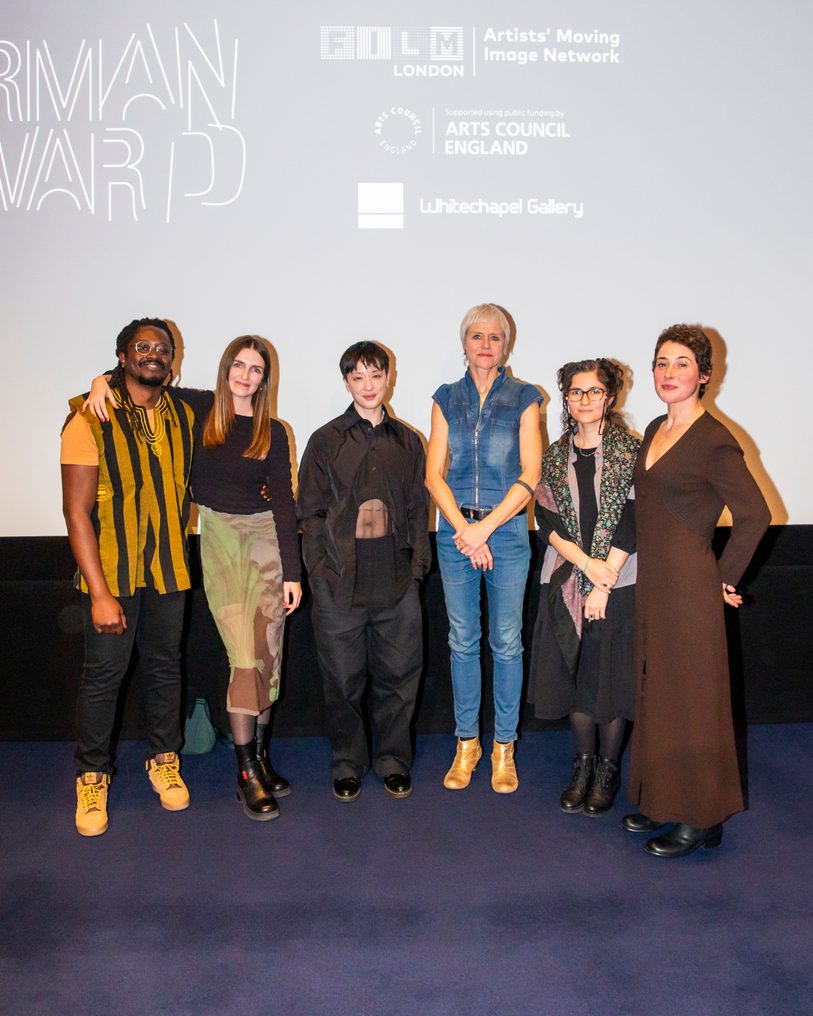
The Film London Jarman Award 2024 shortlisted artists (from left to right): Larry Achiampong, Maeve Brennan, Sin Wai Kin, Melanie Manchot, Maryam Tafakory and Rosalind Nashashibi
